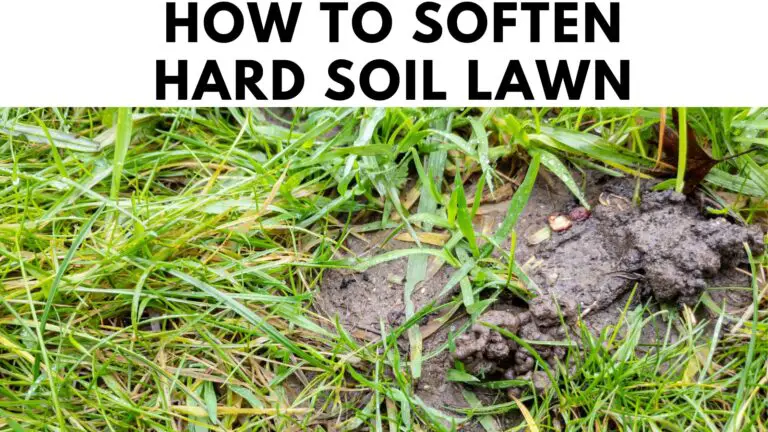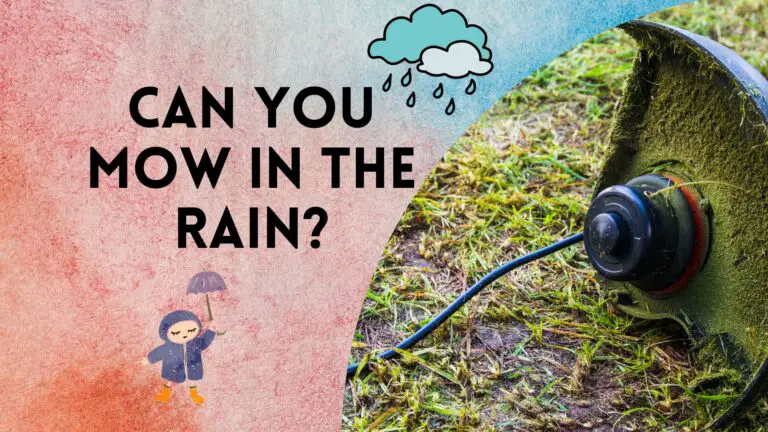How To Keep Rabbits Out Of Yard Naturally?
Rabbits are cute, but they can be aggressive and destructive, especially if you have a lovely garden or yard. They will devour your plants and harm the appearance of your yard if they burrow nearby or on your land. This post will show you how to keep rabbits out of yard naturally and easily.
If you’re looking for the best rabbit repellent, keep in mind that there is no one-size-fits-all solution for getting rid of these pests.
Depending on the type of plants you have and the intensity of the infestation, you may need to test a few different remedies before settling on the ideal one for you.
Anyway, here’s all you need to know about wild rabbits before you discover rabbit repellents.
Why Are Rabbits Coming Into My Yard?
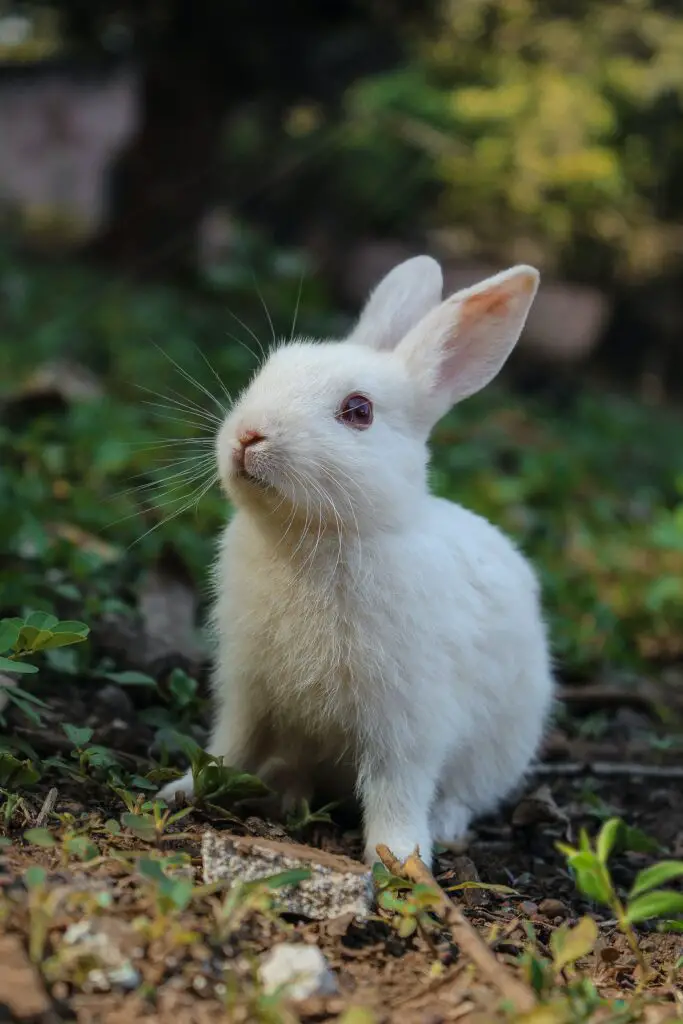
When it comes to getting rid of scaring rabbits, one of the first things to examine is why they are coming into your yard. It’s a smart deterrent to remove some of the reasons they want to access your yard in the first place.
Rabbits invade your yard for one of two reasons: food or safety. If you can readily remove one of these, your problem will solve.
Rabbits consume potted plants near the ground, and they might be an excellent feast for a hungry rabbit. Your insect problem will solve by moving potted plants to a higher location.
Trimming shrubs or bushes that provide cover for rabbits is another technique to keep them away. We’ll also look at several additional tried and true ways to naturally get rid of rabbits.
How To Keep Rabbits Out Of Yard?
Here are some ways to keep rabbits out of your yard.
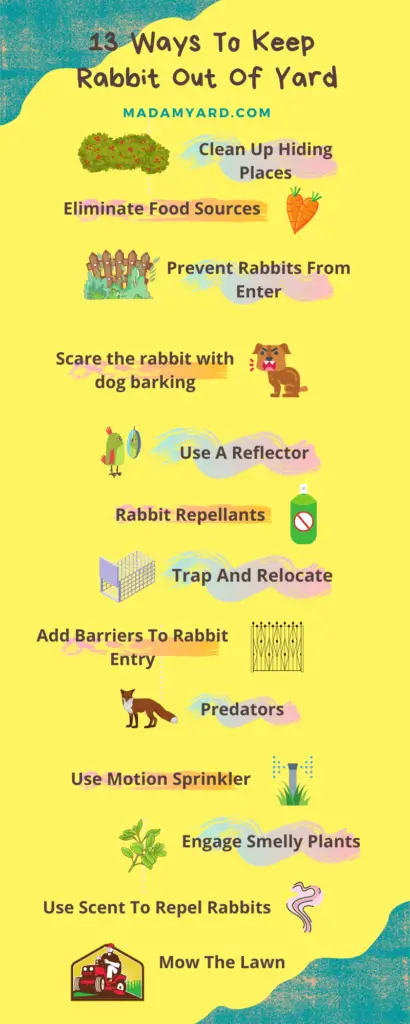
1. Clean Up Hiding Places
Rabbits have a lot of predators, so it’s normal for them to want to be safe. Bushes, low-hanging branches, and other hiding spots are great for rabbits.
If you remove the safety appeal, the rabbits will be less likely to hide on your land. Wide-open spaces are less appealing to rabbits than locations where they can hide or burrow.
We once spent over two hours chasing a rabbit out of our garage, which resulted in an endless noise.
Rabbits can’t get beneath your deck if the crystalline lattice fences with chicken wire. Examine the surrounding sheds and other structures for more rabbit tunnels and hiding spots.
- Cut back low-hanging shrubs and branches.
- Seal off hiding locations on your property by fencing in the deck with chicken wire.
- Seal off or eliminate extra hiding places around your property.
- Keep the areas under structures sealed.
2. Eliminate Food Sources
Rabbits eat a lot, so they’re always on the lookout for more. As a result, the fragrance of your yard may be inviting rabbits in.
Containers with lids can use to keep fruit and rubbish confined. Tree bark, vegetables, potted plants, and other forms of food will attract rabbits.
Although it is rarely practicable to remove food sources, you may make them more complex to get.
3. Prevent Rabbits From Enter
Another strategy to keep rabbits out of your garden is to prevent them from entering in the first place.
If you have areas where there are gaps or a hedge instead of a fence, rabbit netting is a good addition to robust garden fence ideas.
It is constructed of galvanized steel that has been woven into a design with small hexagonal holes that are no more than one inch in diameter.
Tree and plants’ bark can also be preserved. Around the trunks of young trees, place cylinders fashioned from hardware cloth, a galvanized wire screen available in rolls at garden retailers.
Bury the bottom half of the trunk in the ground, approximately an inch away from the trunk itself.
4. Keep Rabbits Away By Unleashing Buddy
Because rabbits are sensitive to sound, a barking dog will undoubtedly serve as a reliable warning signal. Furthermore, because wild dogs are real rabbit predators, they are initially cautioned.
However, using a dog to scare away a rabbit is not foolproof. Although dogs act as a deterrent, they do not ensure that rabbits stay away.
Aside from the fact that some dogs cannot detect the scent of a rabbit, most dogs sleep at night and become exhausted rapidly.
5. Use A Reflector
Did you know that rabbits are terrified of themselves in the mirror? These reflectors will reflect the rabbit’s reflection, scare the rodent away, and leave you with a lovely piece of lawn art!
If you don’t want to use a little animal figurine, fill a transparent glass jar halfway with water and set it near the rabbit’s preferred eating site. The reflection of the water in the jar will scare the rabbit away.
6. Use Rabbit Repellants
Commercial rabbit repellents are available online and at certain garden shops. If you’re looking for a simple and low-maintenance way to keep rabbits out of your garden or yard, these are great.
Sprays and granular solutions are available. They work because rabbits repulse by their odor. Choose natural varieties that are safe for pets, plants, and beneficial insects.
Even with natural treatments, please read the label thoroughly before using, keep them out of the reach of children, and avoid spraying or dusting them on edible sections of plants.
7. Trap And Relocate
Trapping and releasing rabbits may be feasible for reducing the local rabbit population. It is, however, critical to verify with your local towns to see whether or not this is legal. If rabbits capture unlawfully, fines and jail time may impose.
Having said that, if trapping is a possibility, it may be an effective way to solve your rabbit problem. Set them in the area where they tend to congregate, bait the trap, then release them in a secure location away from your property once they’ve been caught.
They like how effective these traps are and don’t harm the rabbits. If you have continuous rabbit damage, we believe you should consider utilizing a rabbit trap.
8. Add Barriers To Rabbit Entry
Fencing around the garden or any other place that needs protection is the top tip, as it is when trying to defend against any wildlife. Chicken wire with a 1/2- to 1-inch mesh is a suitable choice to deter rabbits.
The fence should reach at least 6 inches below ground level or be attached to the ground to keep the bottom edge taut to prevent rabbits from digging beneath it.
Temporary management around seasonal gardens can also be achieved using an electric net fence.
Form cylinders around new trees, shrubs, or vines with 1/4- to 1/2-inch mesh chicken wire or hardware fabric. To avoid burrowing, bury the fence 6 inches deep.
Allow several inches of space around the plant, and if the fencing is fragile, add reinforcing to stop the rabbits from forcing through the netting and nibbling.
9. Predators
Rabbits will naturally attract wild predators such as foxes, hawks, owls, and snakes in regions where they are abundant. Wild predators may detect the food supply and set up shop to hunt rabbits even in densely populated areas.
These small predators are rarely a threat to household pets, and they represent no threat to humans. Instead of attempting to scare foxes or hawks away, accept their presence as a solution to your rabbit problem.
Alternatively, if you have a family dog with hunting tendencies who are free to explore your fenced-in yard, rabbits are unlikely to eat any of your plants.
10. Try A Motion Sprinkler
Because rabbits are tiny and wary, spraying them with cold water can be an effective way of scaring them away. Invest in a motion-activated sprinkler instead of lurking in the bushes with a water gun.

Place the sprinkler near your raised garden beds to provide your plants with an extra boost of protection.
You may also discover designs that, in addition to spraying water, make a loud noise, which can prevent intruders.
11. Engage Smelly Plants
Rabbits have excellent olfactory senses. Use that talent against them by using rabbit-repelling plants and odors.
It isn’t a foolproof strategy since desperate rabbits will ignore or become accustomed to the fragrance. Other deterrents, on the other hand, can be strengthened with it.
To keep rabbits out of your carrots, cabbages, and lettuce, grow onions and garlic among them. The overwhelming odor usually turns them away.
- Garlic and onions
- Rhubarb
- Oregano
- Mint
- Parsley
- And basil, geraniums, and daffodils, and hyacinths are some of the plants that rabbits despise
12. Use Scent To Repel Rabbits
Because rabbits have a good sense of smell, a strong fragrance may be a natural deterrent. The easiest technique to naturally get rid of a rabbit is to treat the sensitivity in its nose.
13. Mow The Lawn
Some people’s gardens are overgrown with tall grasses, bushes, and tiny plants. These tall grasses and shrubs provide the ideal hiding spot.
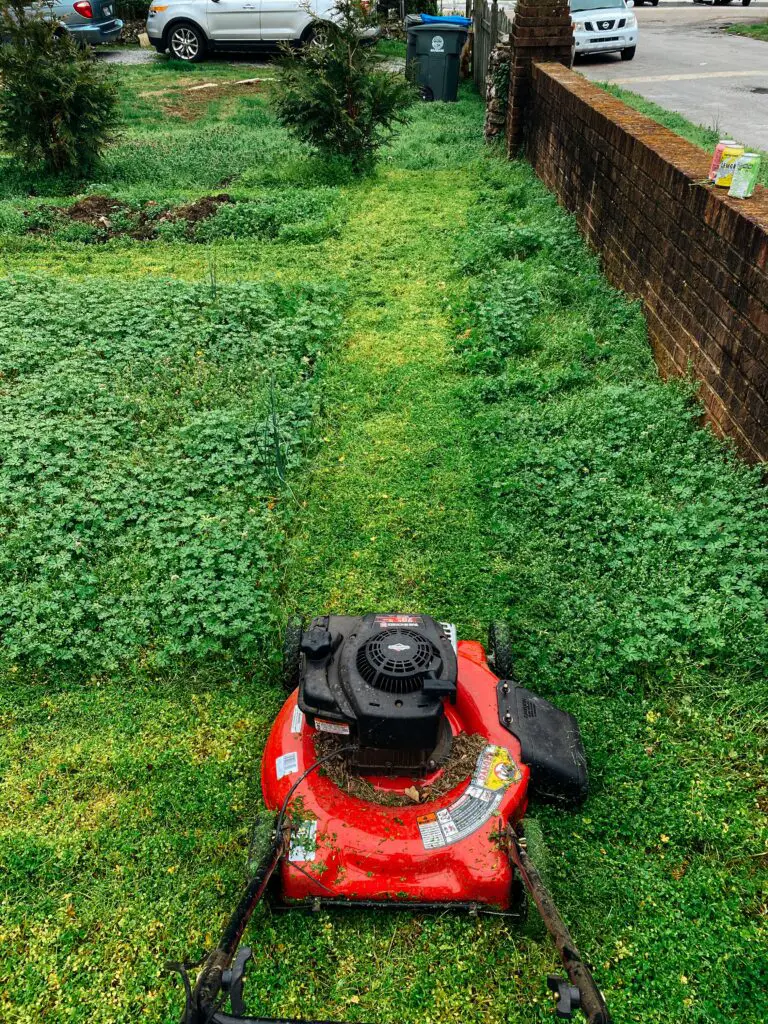
You must remove these extra-long grasses or bushes if you wish to maintain your bushes and plants. Cut down the grass and low-hanging shrub branches since these protect the rabbits.
Daily, clean up all of the plant waste in the garden because the rabbits may use this as a cover. As a result, a tidy and clean garden will be less appealing to rabbits and will safeguard the garden from further harm.
How Bad Can Rabbits Be For Your Yard?
Rabbits may wreak a surprising amount of damage to a person’s yard, despite their sweetness and small size compared to other wild creatures.
It’s not unusual to hear of large vegetable or fruit plots being nearly demolished by rabbit families.
Most individuals are concerned about their rabbit problems because of the gardening alone. If you like trees, though, things might get considerably worse.
Rabbits enjoy eating tree bark, especially in the winter. Rabbits have been known to consume enough bark to destroy trees in yards permanently.
Conclusion
All of these rabbit repellents will aid you in your efforts to prevent harm caused by rabbits.
These were the best rabbit deterrent items we could locate after considerable research. Countless testimonies attest to how effective they are in removing these pests.
Start with rabbit repellent sprays/granules or electronic rabbit repellents since they are frequently adequate to keep these critters off your property.
However, if they are insufficient, a rabbit fence may be the only way to solve your problem.
As a result, you’re now one step closer to owning a rabbit-free property! We hope you found our rabbit-removal advice useful!
Frequently Asked Questions (FAQs)
Q. What Are Some Of The Most Prevalent Rabbit Signs?
A. An area littered with gritty, spherical fecal pellets, rabbit scat (poop) is one of the most dependable signs of raiding rabbits.
These can range from 1/4 to 1/2 inch depending on the species. Rabbit hair or fur stuck on or under tree branches, rabbit paths, or nesting locations beneath shrubs or vegetation are other possible sightings.
Q. Do Sounds Scare Rabbits Away?
A. Noisemakers, flashing lights, and ultrasonic sound waves, designed to terrify or dissuade rabbits, do not scare or impact them. The rabbits will quickly learn to ignore these precautions and continue merrily eating on your plants.
Q. Are Scarecrows A Threat To Rabbits?
A. Scarecrows are sold as fake owls, snakes, and hawks intended to scare rabbits and other pest animals away. They are ineffective.
Q. Are Rabbits Disease Carriers?
A. Tularemia, often known as rabbit fever, is the most prevalent illness transmitted and spread by cottontail rabbits.
Tularemia can be transmitted to people by contaminated food or water, eating infected rabbits, blood-feeding insects such ticks, mosquitos, fleas, and flies, or inhaling dust from infected animal feces, tissue, or urine.4

